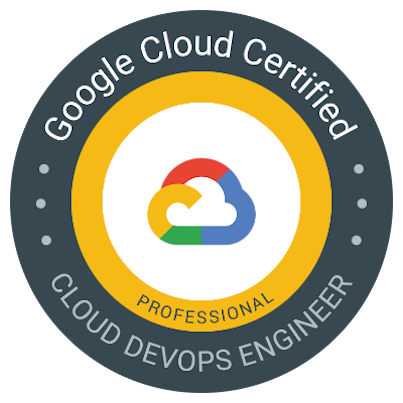

This class is designed to help IT professionals prepare for the Google Professional Cloud DevOps Engineer certification exam. A Professional Cloud DevOps Engineer is responsible for efficient development operations that can balance service reliability and delivery speed. The Professional Cloud DevOps exam assesses your ability to apply site reliability engineering (SRE) principles, optimize service performance, implement service monitoring strategies, build and implement CI/CD pipelines, and manage service incidents.
This Track Includes:
Logging, Monitoring, and Observability – 3 Days
Duration
3 Days
Description
Learn how to monitor, troubleshoot, and improve your infrastructure and application performance. Guided by the principles of Site Reliablity Engineering (SRE), this course features a combination of lectures, demos, hands-on labs, and real-world case studies. In this course, you’ll gain experience with full-stack monitoring, real-time log management and analysis, debugging code in production, and profiling CPU and memory usage.
Topics covered
- Infrastructure
- Application Development
- Security
Objectives:
This course teaches participants the following skills:
- Plan and implement a well-architected logging and monitoring infrastructure.
- Define Service Level Indicators (SLIs) and Service Level Objectives (SLOs).
- Create effective monitoring dashboards and alerts.
- Monitor, troubleshoot, and improve Google Cloud infrastructure.
- Analyze and export Google Cloud audit logs.
- Find production code defects, identify bottlenecks, and improve performance.
- Optimize monitoring costs
Course Outline
The course includes presentations, demonstrations, and hands-on labs.
Module 1: Introduction to Google Cloud Monitoring Tools
- Understand the purpose and capabilities of Google Cloud operations-focused components: Logging, Monitoring, Error Reporting, and Service Monitoring.
- Understand the purpose and capabilities of Google Cloud application performance management focused components: Debugger, Trace, and Profiler.
Module 2: Avoiding Customer Pain
- Construct a monitoring base on the four golden signals: latency, traffic, errors, and saturation.
- Measure customer pain with SLIs.
- Define critical performance measures.
- Create and use SLOs and SLAs.
- Achieve developer and operation harmony with error budgets.
Module 3: Alerting Policies
- Develop alerting strategies.
- Define alerting policies.
- Add notification channels.
- Identify types of alerts and common uses for each.
- Construct and alert on resource groups.
- Manage alerting policies programmatically.
Module 4: Monitoring Critical Systems
- Choose best practice monitoring project architectures.
- Differentiate Cloud IAM roles for monitoring.
- Use the default dashboards appropriately.
- Build custom dashboards to show resource consumption and application load.
- Define uptime checks to track aliveness and latency.
Module 5: Configuring Google Cloud Services for Observability
- Integrate logging and monitoring agents into Compute Engine VMs and images.
- Enable and utilize Kubernetes Monitoring.
- Extend and clarify Kubernetes monitoring with Prometheus.
- Expose custom metrics through code, and with the help of OpenCensus.
Module 6: Advanced Logging and Analysis
- Identify and choose among resource tagging approaches.
- Define log sinks (inclusion filters) and exclusion filters.
- Create metrics based on logs.
- Define custom metrics.
- Link application errors to Logging using Error Reporting.
- Export logs to BigQuery.
Module 7: Monitoring Network Security and Audit Logs
- Collect and analyze VPC Flow logs and Firewall Rules logs.
- Enable and monitor Packet Mirroring.
- Explain the capabilities of Network Intelligence Center.
- Use Admin Activity audit logs to track changes to the configuration or metadata of resources.
- Use Data Access audit logs to track accesses or changes to user-provided resource data.
- Use System Event audit logs to track GCP administrative actions.
Module 8: Managing Incidents
- Define incident management roles and communication channels.
- Mitigate incident impact.
- Troubleshoot root causes.
- Resolve incidents.
- Document incidents in a post-mortem process.
Module 9: Investigating Application Performance Issues
- Debug production code to correct code defects.
- Trace latency through layers of service interaction to eliminate performance bottlenecks.
- Profile and identify resource-intensive functions in an application.
Module 10: Optimizing the Costs of Monitoring
- Analyze resource utilization cost for monitoring related components within Google Cloud.
- Implement best practices for controlling the cost of monitoring within Google Cloud.
Audience:
- This class is intended for the following participants:
- Cloud architects, administrators, and SysOps personnel.
- Cloud developers and DevOps personnel
Prerequisites
To get the most out of this course, participants should have:
- Google Cloud Platform Fundamentals: Core Infrastructure or equivalent experience.
- Basic scripting or coding familiarity.
- Proficiency with command-line tools and Linux operating system environments
Certification
Google Cloud Certified – Professional Cloud DevOps Engineer
Below is a Course Schedule for this:
2024
| Jan | Feb | Mar | Apr | May | Jun |
|---|---|---|---|---|---|
| 17,18,19 | 21,22,23 | 20,21,22 | 24,25,26 | 29,30,31 | 26,27,28 |
| July | Aug | Sep | Oct | Nov | Dec |
|---|---|---|---|---|---|
| 12,13,14 | 16,17,18 | 20,21,22 | 18,19,20 | 15,16,17 | 13,14,15 |
Duration: 4 Days
Course Fee
| Course Fee | $2250.00 |
| SME (Company Sponsored) – All Singaporean and Permanent Resident Employee | NA |
| Singapore Citizens aged 40 years old and above | NA |
| Singapore Citizen and Permanent Resident aged 21 years old and above | NA |